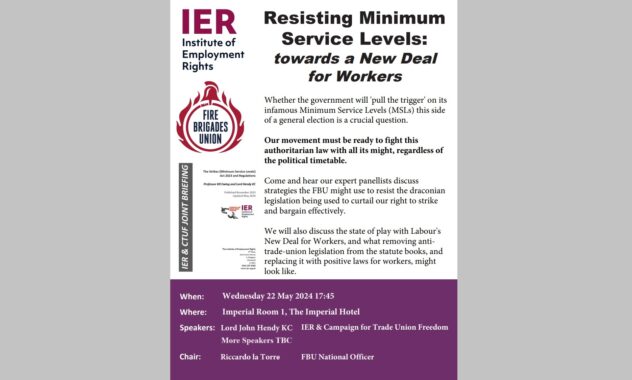‘This is an Elephant Trap’ – Lord Hendy speaks in the House of Lords Strike Bill debate
Strikes (Minimum Service Levels) Bill Report Stage in the House of Lords - 26th April 2023

Lord John Hendy‘s speech in the Strikes (Minimum Service Levels) Bill debate in the House of Lords (video below)
26th April 2023 (from Hansard)
‘My Lords, I rise to support Amendments 4 and 5. I will be brief and speak only about Amendment 5. The purpose of the proposed new Section 234E is objectionable, for all the reasons my noble friend Lord Collins has spelled out: the ethical objection to requiring a union to undermine its own otherwise lawful strike. There is a more fundamental point here; this is an elephant trap. The purpose of this provision is to enable employers to get injunctions to prevent unions conducting a strike that has been balloted.
I am reminded that, 44 years ago, I stood at the Bar of this House as junior counsel in a case called Express Newspapers Ltd v McShane and Ashton. Since then, I must have done dozens of strike cases. I know what my learned friends will say, representing employers in the sort of case where this issue arises; they will say that the union has failed to take reasonable steps. The union will produce a witness statement setting out all the steps it has taken, and the employers will say, “Ah, but there’s one step you didn’t take”, and they will say what it was.
This Bill does not say what the reasonable steps are or what factors are to be taken into consideration. That is in contrast, for example, to Section 238A of the Trade Union and Labour Relations (Consolidation) Act 1992; in dealing with dismissals during a strike, it set outs the words “reasonable steps” and says expressly what factors a court is to take into account in determining whether reasonable steps have been taken or not.
This section, as drafted, gives no indication whatever. For example, does it extend to specific encouragement given by the union to particular people named in the work notice? In a big strike such as the teachers’ strike, the union may have been notified of tens of thousands of members on a daily basis who are required to provide minimum service. Does it require the union to threaten to discipline its own members for refusing to comply with a work notice or to expel members who refuse to comply with one? All these matters are to be left to courts to determine and to unions to fight.
If the union is found not to have taken a reasonable step, as my noble friend Lord Collins spelled out, the consequences are that the strike will be unlawful and anybody participating in it will have no protection at all against unfair dismissal. The union will be exposed to a claim for damages; if it does not comply with the injunction or payment of damages, it will be at risk of proceedings for contempt of court. New Section 234E is wholly objectionable and I hope that all Members of the House will join me in opposing it.’
The full transcript of all speeches in the Lords debate on the Strikes (Minimum Service Levels) Bill can be read here.







